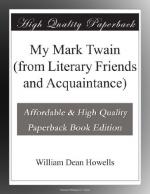He was the most caressing of men in his pity, but he had the fine instinct, which would have pleased Lowell, of never putting his hands on you—fine, delicate hands, with taper fingers, and pink nails, like a girl’s, and sensitively quivering in moments of emotion; he did not paw you with them to show his affection, as so many of us Americans are apt to do. Among the half-dozen, or half-hundred, personalities that each of us becomes, I should say that Clemens’s central and final personality was something exquisite. His casual acquaintance might know him, perhaps, from his fierce intensity, his wild pleasure in shocking people with his ribaldries and profanities, or from the mere need of loosing his rebellious spirit in that way, as anything but exquisite, and yet that was what in the last analysis he was. They might come away loathing or hating him, but one could not know him well without realizing him the most serious, the most humane, the most conscientious of men. He was Southwestern, and born amid the oppression of a race that had no rights as against ours, but I never saw a man more regardful of negroes. He had a yellow butler when I first began to know him, because he said he could not bear to order a white man about, but the terms of his ordering George were those of the softest entreaty which command ever wore. He loved to rely upon George, who was such a broken reed in some things, though so stanch in others, and the fervent Republican in politics that Clemens then liked him to be. He could interpret Clemens’s meaning to the public without conveying his mood, and could render his roughest answer smooth to the person denied his presence. His general instructions were that this presence was to be denied all but personal friends, but the soft heart of George was sometimes touched by importunity, and once he came up into the billiard-room saying that Mr. Smith wished to see Clemens. Upon inquiry, Mr. Smith developed no ties of friendship, and Clemens said, “You go and tell Mr. Smith that I wouldn’t come down to see the Twelve Apostles.” George turned from the threshold where he had kept himself, and framed a paraphrase of this message which apparently sent Mr. Smith away content with himself and all the rest of the world.
The part of him that was Western in his Southwestern origin Clemens kept to the end, but he was the most desouthernized Southerner I ever knew. No man more perfectly sensed and more entirely abhorred slavery, and no one has ever poured such scorn upon the second-hand, Walter-Scotticized, pseudo-chivalry of the Southern ideal. He held himself responsible for the wrong which the white race had done the black race in slavery, and he explained, in paying the way of a negro student through Yale, that he was doing it as his part of the reparation due from every white to every black man. He said he had never seen this student, nor ever wished to see him or know his name; it was quite enough that he was a negro. About that time a




